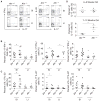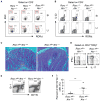Group 3 innate lymphoid cells inhibit T-cell-mediated intestinal inflammation through aryl hydrocarbon receptor signaling and regulation of microflora
- PMID: 23954130
- PMCID: PMC3884586
- DOI: 10.1016/j.immuni.2013.08.002
Group 3 innate lymphoid cells inhibit T-cell-mediated intestinal inflammation through aryl hydrocarbon receptor signaling and regulation of microflora
Abstract
Aryl hydrocarbon receptor (Ahr) is crucial for the maintenance and function of group 3 innate lymphoid cells (ILCs), which are important in gut immunity. Because Ahr promotes T helper 17 (Th17) cell differentiation in vitro, it is reasonable to expect that Ahr would enhance Th17 cells in vivo. Instead, we show that Ahr deficiency caused increased intestinal Th17 cells, raising the possibility that group 3 ILCs could negatively regulate Th17 cells. Reduced innate interleukin-22 (IL-22) in Ahr-deficient mice allowed expansion of commensal segmented filamentous bacteria (SFB), known to promote Th17 cells. Compared to Rorc(+/+)Ahr(-/-) mice, Rorc(gfp/+)Ahr(-/-) mice had further reduced group 3 ILCs and were prone to spontaneous colitis with increased SFB and Th17 cells. Innate expression of Ahr played a protective role in T-cell-mediated experimental colitis by suppressing pathogenic Th17 cells. Our data reveal an intricate balance between ILCs and Th17 cells regulated by Ahr and commensal flora.
Copyright © 2013 Elsevier Inc. All rights reserved.
Figures







Comment in
-
Keeping the peace: aryl hydrocarbon receptor signaling modulates the mucosal microbiota.Immunity. 2013 Aug 22;39(2):206-7. doi: 10.1016/j.immuni.2013.08.012. Immunity. 2013. PMID: 23973218
References
Publication types
MeSH terms
Substances
Grants and funding
LinkOut - more resources
Full Text Sources
Other Literature Sources
Molecular Biology Databases

